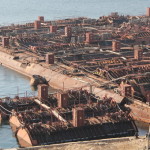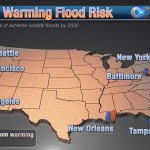- DETERRENCE: Russian Drills Aim at Potential Nuclear Disaster Response – Ministry
- DPRK: S. Korea to Provide 3 Billion Won in Aid to N. Korea
- ENERGY SECURITY: The Big Green Test – Conservatives and Climate Change
- GOVERNANCE AND CIVIL SOCIETY: Pathways to Deep Decarbonisation: Interim 2014 Report
- CLIMATE CHANGE ADAPTATION: A Geospatial Dataset for U.S. Hurricane Storm Surge and Sea-level Rise Vulnerability: Development and Case Study Applications
- CLIMATE CHANGE AND SECURITY: Pathways to Deep Decarbonisation: Interim 2014 Report
 DETERRENCE: Russian Drills Aim at Potential Nuclear Disaster Response – Ministry, Nuclear waste disposal plant in Fokino (Russia’s Primorsky region), Ilya Gorbunov, RIA Novosti, July 14, 2014
DETERRENCE: Russian Drills Aim at Potential Nuclear Disaster Response – Ministry, Nuclear waste disposal plant in Fokino (Russia’s Primorsky region), Ilya Gorbunov, RIA Novosti, July 14, 2014
Russian Eastern Military District will simulate a nuclear disaster July 14-17. Command and staff drills plus nuclear materials aboard Pacific Fleet ships will test emergency nuclear accident response. Rosatom and Emergency Situations Ministry will also participate. Image: Russian warships hold nuclear defense drills in Indian Ocean, RIA Novosti, May 5, 2010 16:58 05/05/2010
- Drills in Far East to involve warships of three Russian fleets, A. Smirnov, RIA Novosti, April 23, 2010
- Japan-Russia-United States Study Group on Dumped Nuclear Waste in the Sea of Japan, Sea of Okhotsk, and the North Pacific Ocean. Findings and Recommendations 12-13 January 1995 [PDF, 1.23MB]
 DPRK: S. Korea to Provide 3 Billion Won in Aid to N. Korea, Qatar News Agency (15 July 2014)
DPRK: S. Korea to Provide 3 Billion Won in Aid to N. Korea, Qatar News Agency (15 July 2014)
There are more mixed signals coming from both parties on the Korean peninsula. As a whole, they can be interpreted as being mildly positive and a likely indicator of an inflection point sometime in the next few months. North Korea has launched over 100 missiles this year that have been mostly ignored. On the positive side, North and South are reaching out in tenuous ways: South Korea is sending aid to North Korea and re-extended invitations to North Korean Catholics to attend the Pope’s mass in Seoul, both sides are discussing their languages which have grown apart for over 50 years, and North Korea was discussed between the Presidents of China and the United States.
- Two Koreas make strides to talk the same language. Steven Borowiec, The Guardian. (11 July 2014)
- Papal visit aims to push reunion of North and South Korea – Seoul cardinal. Miko Morelos, Ecumenical News. (6 July 2014)
- Obama, Xi discuss Iran, North Korea. Dow Jones Business News (14 July 2014)
 ENERGY SECURITY: The Big Green Test – Conservatives and Climate Change, Paul Krugman, New York Times (22 June 2014)
ENERGY SECURITY: The Big Green Test – Conservatives and Climate Change, Paul Krugman, New York Times (22 June 2014)
Current or future generations will not be saved by saddling them with yet more debt (if carbon tax is to be revenue neutral and non/low-carbon substitutes close the cost gap). Krugman deceives even as he fakes realism, “A carbon tax may be the best thing we could do, but we won’t actually do it.” If climate change doesn’t ravage us, the climate action mafia can simply say their tricks worked, the protection money had to be paid. Some economists carry a high social cost.
- Birth of a climate mafia: Why a green-pork blowout would do more harm than good, Holman Jenkins, Opinion, Wall Street Journal (1 July 2014)
- The carbon regulation bubble, Editorial, Wall Street Journal (1 July 2014)
- The loneliness of the non-crazy Republican, Paul Krugman, Blog The Conscience of a Liberal, New York Times (22 June 2014)
 GOVERNANCE AND CIVIL SOCIETY: China Trying to Restructure US-Japan-Centered Global Economy, Business Korea (8 July 2014)
GOVERNANCE AND CIVIL SOCIETY: China Trying to Restructure US-Japan-Centered Global Economy, Business Korea (8 July 2014)
The BRICS countries agreed to establish a multilateral development bank and reserve pool headquartered in Shanghai, considered to be the first major step in reshaping a Western-dominated international financial system. China is also seeking to set up an infrastructure bank focused on the Asia region, seen by many as a potential competitor to the heavily US and Japan-influenced ADB.
- BRICS set up Shanghai-based bank to counter Western grip on global finances, Reuters (16 July 2014)
- New BRICS bank to be based in China, India to have presidency, AFP (16 July 2014)
- Korea asks China for the AIIB headquarters, Park Jin-seok, Song Su-hyun, Joongang Ilbo (15 July 2014)
 CLIMATE CHANGE ADAPTATION: A Geospatial Dataset for U.S. Hurricane Storm Surge and Sea-level Rise Vulnerability: Development and Case Study Applications, Article in Press, Megan C. Maloney, Benjamin L. Preston, Climate Risk Management (April 2014) [Open Access]
CLIMATE CHANGE ADAPTATION: A Geospatial Dataset for U.S. Hurricane Storm Surge and Sea-level Rise Vulnerability: Development and Case Study Applications, Article in Press, Megan C. Maloney, Benjamin L. Preston, Climate Risk Management (April 2014) [Open Access]
Enhancing understanding of the implications of climate variability and change for coastal assets and communities is a high priority for researchers as well as coastal managers. Over the past decade, natural disasters at disparate points along the U.S. coast including Hurricanes Sandy, Katrina, and Irene have contributed billions of dollars in direct and indirect economic losses, displaced millions, and caused significant morbidity and mortality. Such discrete events, as well as a general upward trend in U.S. disaster losses, have highlighted the vulnerability of the U.S. coastal population and built environment to extreme weather events.
- Storm Surge Overview, the National Weather Service, National Oceanic and Atmospheric Administration (NOAA), US Department of Commerce (2014)
- Assessment of Inundation Risk from Sea Level Rise and Storm Surge in Northeastern Coastal National Parks, Journal of Coastal Research: volume 29, issue 6a, pp. 1-16 (2013) [2.24 MB, PDF]
 CLIMATE CHANGE AND SECURITY: Pathways to Deep Decarbonisation: Interim 2014 Report, Sustainable Development Solutions Network and the Institute for Sustainable Development and International Relations (July 2014)
CLIMATE CHANGE AND SECURITY: Pathways to Deep Decarbonisation: Interim 2014 Report, Sustainable Development Solutions Network and the Institute for Sustainable Development and International Relations (July 2014)
A 4oC warmer world is increasingly likely for people alive today, with prospects of even a risky 2oC limit by mid-century now, a year before global climate talks, “way off track” (Jeffrey Sachs). Deep decarbonization pathways – technology shifts for steep declines in carbon intensity in all energy systems – for individual countries are not that complicated – just hard. But the UK MoD identifies GHG mitigation failure as a low probability but still foreseeable catastrophic outcome.
- Global strategic trends – out to 2045 (Fifth Edition), U.K. Ministry of Defence (30 June 2014)
- Valuing national security: climate change, the military, and society, Sarah E. Light, UCLA Law Review, Vol. 61 (July 2014)
- Climate suffering, Paul Wapner, Global Environmental Politics, Vol. 14, No. 2 (May 2014)
The Nautilus Peace and Security Weekly Report presents articles and full length reports each week in six categories: Austral security, nuclear deterrence, energy security, climate change and security, the DPRK, climate change adaptation and governance and civil society. Our team of contributors carefully select items that highlight the links between these themes and the three regions in which our offices are found—North America, Northeast Asia, and the Austral-Asia region.
- Subscribe to NAPSNet to receive free weekly email reportsEditor
Contributors:
- Deterrence: Peter Hayes
- DPRK: Roger Cavazos
- Governance and Civil Society: Dyana Mardon
- Energy Security: Nikhil Desai
- Climate Change Adaptation: Saleem Janjua
- DPRK: Roger Cavazos
- Austral Peace and Security: Richard Tanter

